Becoming a war correspondent is a challenging yet rewarding career path that requires a unique set of skills, experiences, and attributes. War correspondents play a crucial role in reporting on conflicts, political unrest, humanitarian crises, and other significant events from conflict zones around the world. Their work provides essential insights and firsthand accounts that shape public understanding and awareness of global issues.
To embark on the journey of becoming a war correspondent, aspiring journalists must be prepared for the demands and risks associated with covering conflict zones. Here are some key steps and considerations for individuals aspiring to pursue a career as a war correspondent:
1. Develop Strong Journalism Skills
At the core of being a successful war correspondent is a solid foundation in journalism. Strong writing, reporting, and storytelling skills are essential for effectively communicating the realities of conflict to audiences. Aspiring war correspondents should hone their abilities to gather information, conduct interviews, and craft compelling narratives that capture the complexities of war.
2. Gain Field Experience
Hands-on experience in the field is invaluable for aspiring war correspondents. Internships, freelance opportunities, and entry-level positions at news organizations can provide valuable exposure to reporting in challenging environments. Building a portfolio of work that demonstrates a commitment to covering sensitive and impactful stories is essential for establishing credibility as a war correspondent.
3. Develop Cultural Awareness and Sensitivity
War correspondents must navigate diverse cultural landscapes and engage with communities affected by conflict. Developing cultural awareness, sensitivity, and language skills can enhance the ability to establish rapport with sources, understand local perspectives, and report ethically and responsibly from conflict zones.
4. Build a Network of Contacts
Establishing a network of contacts within the journalism industry, international organizations, and local communities can open doors to valuable opportunities for reporting on conflicts. Building relationships with editors, fellow journalists, fixers, and NGOs can provide access to information, resources, and support while working in challenging environments.
5. Prioritize Safety and Security
The safety and security of war correspondents are paramount. Training in hostile environment awareness, first aid, risk assessment, and conflict reporting protocols is essential for mitigating risks while reporting from conflict zones. Adhering to ethical guidelines, staying informed about security threats, and having a contingency plan in place are crucial aspects of ensuring personal safety and well-being.
6. Embrace Flexibility and Adaptability
Reporting from conflict zones requires flexibility, adaptability, and resilience in the face of unpredictable situations and challenges. War correspondents must be prepared to work long hours, travel to remote locations, and navigate changing circumstances with professionalism and composure.
7. Stay Informed and Educated
Continuous learning and staying informed about global events, political developments, and conflict dynamics are essential for war correspondents. Keeping abreast of emerging trends, understanding geopolitical contexts, and conducting thorough research are critical for producing accurate and insightful reporting from conflict zones.
8. Seek Mentorship and Guidance
Seeking mentorship from experienced journalists and war correspondents can provide valuable insights, guidance, and support for navigating the complexities of reporting on conflicts. Learning from seasoned professionals, receiving constructive feedback, and benefiting from mentorship programs can accelerate the growth and development of aspiring war correspondents.
9. Demonstrate Resilience and Compassion
Reporting on conflict and humanitarian crises can take a toll on the mental and emotional well-being of war correspondents. Developing resilience, self-care practices, and seeking support when needed are essential for maintaining mental health and emotional balance in demanding and high-stress environments. Compassion, empathy, and a commitment to ethical reporting are foundational principles for war correspondents striving to amplify the voices of those affected by conflict.
10. Pursue Specialized Training and Education
Enrolling in specialized training programs, workshops, and courses that focus on conflict reporting, journalism ethics, and safety protocols can enhance the skills and knowledge of aspiring war correspondents. The Yellowbrick online courses offer valuable resources and expertise in journalism, storytelling, and media production to equip individuals with the tools and insights needed to excel in the field of conflict reporting.
Conclusion
Becoming a war correspondent is a challenging yet fulfilling journey that requires dedication, perseverance, and a deep commitment to truth-telling and storytelling. By following these steps, aspiring journalists can embark on a path that allows them to make a meaningful impact, amplify marginalized voices, and contribute to a more informed and empathetic global community.
Key Takeaways:
- Develop strong journalism skills to effectively communicate the realities of conflict.
- Gain field experience through internships and entry-level positions to build credibility.
- Prioritize safety, cultural awareness, and resilience when reporting from conflict zones.
- Stay informed, seek mentorship, and pursue specialized training for success in conflict reporting.
Consider taking the Yellowbrick online course and certificate program, NYU | Modern Journalism, to enhance your skills and excel in the field of conflict reporting.








